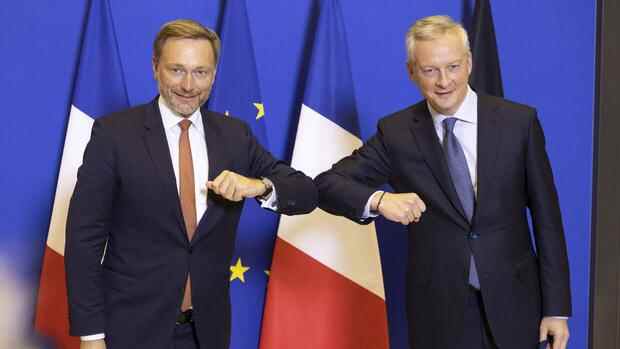Paris The federal government is keeping one of its most important contacts in Paris: Bruno Le Maire, who knows Germany well, will continue to head the Super Ministry for Finance and Economics after the reshuffle of the government of French President Emmanuel Macron. After his confirmation in the powerful office, Le Maire told the Handelsblatt that he wanted to make the fight against the sharp rise in consumer prices a priority together with Berlin.
“Franco-German relations are more necessary than ever in these new economic times, marked by increased inflation,” he said. With Finance Minister Christian Lindner (FDP) and Economics Minister Robert Habeck (Greens), he wants to develop a “clear economic strategy” to cushion the consequences of inflation in the European Union.
There is concern around Le Maire that uncoordinated national measures could hamper the fight against inflation in the monetary union. Better coordination in Europe is urgently needed – especially in efforts to lower energy prices, which have risen sharply because of the Russian war against Ukraine.
Law to protect purchasing power planned in France
Top jobs of the day
Find the best jobs now and
be notified by email.
France already took a number of measures last autumn to curb the rise in the cost of living. These include the capping of gas and electricity prices as well as a tank discount. In a speech on Saturday, Le Maire announced that he would immediately start work on a law to strengthen the purchasing power of the French, which Macron has promised for the summer.
The new French Prime Minister Elisabeth Borne promised in a television interview at the weekend: “We will continue to protect the purchasing power of the French.” The planned law provides for food checks for low earners, pensions and social assistance would be increased. In addition, the possibility for companies to pay tax-free bonuses to their employees is to be expanded.
Macron made Borne prime minister earlier last week. On Friday she then presented the cabinet with which the president, who was re-elected at the end of April, wants to go into his second term. However, the new government team is subject to the condition that Macron’s center alliance can defend its majority in the National Assembly in the parliamentary elections in three weeks.
Continuity after government reshuffle in Paris
The President is counting on continuity in several key departments: In addition to Le Maire, Interior Minister Gérald Darmanin and Justice Minister Éric Dupond-Moretti will remain in office. There is a change in the Foreign Ministry: Catherine Colonna, former French Ambassador to London and former Minister for Europe, is succeeding Jean-Yves Le Drian.
Sébastien Lecornu, previously Minister for Overseas Territories, will be the new Defense Minister. In total, the French government will consist of 17 ministries, eight of which will be headed by a woman. The new cabinet will hold its first meeting in Paris on Monday.
From a German point of view, Le Maire’s retention at the head of the finance and economics department is particularly important. The 53-year-old, who speaks fluent German, maintains close contact with Lindner and Habeck, who share the responsibility of his Paris ministry in Berlin.
He is also on good terms with Chancellor Olaf Scholz (SPD), with whom he worked during his time as finance minister in the grand coalition. Together they pushed ahead with the idea of a global minimum tax for corporations and then prepared the historic decision to take out joint debt in the EU for the first time in order to boost the economy in the member states with a 750 billion euro fund during the pandemic.
Le Maire advocates a reform of European debt rules. At the same time, the minister repeatedly assures that he stands for a solid financial policy in France. Before the pandemic spurred government spending, he briefly brought the French budget deficit back below 3 percent of gross domestic product.
Commitment to sound fiscal policy
In his first speech after being confirmed in office on Saturday, Le Maire said controlling public spending is part of the “political DNA” of Macron’s alliance. However, the billions spent during the Corona period were necessary because they would have prevented a wave of company bankruptcies and unemployment that would have been even more expensive for the country. The state must also spend money to protect citizens from inflation. Nevertheless, the government in Paris still stands “by the obligation to reduce public debt and the budget deficit”.
The minister makes no secret of the fact that he considers the German energy policy of the past two decades to be a mistake. Even before the Ukraine crisis, he criticized Germany’s dependence on Russian gas. He thinks the French way, a mixture of nuclear power and the expansion of renewable energies, is superior.
However, Le Maire tries to ignore the Franco-German conflict on nuclear energy as far as possible. Instead, he wants to focus on joint projects for European independence in the energy sector and the fight against climate change, such as the creation of production capacities for green hydrogen.
In the coming years he wants to turn his department into a “model ministry for ecological change”, he said. All political decisions would be based on this goal – from the decarbonization of industry to the “green budget” with investments in climate protection.
More: Lindner sees “enormous danger” in inflation
